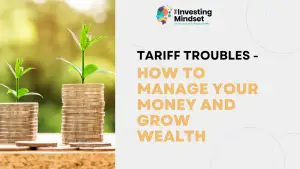
As a child, I thought about wealth as a fantasy. I had this idea that the individuals with wealth were the ones that drove luxury cars, lived in big houses, and traveled abroad for vacations.
Growing up and studying money and wealth creation, I realized I was wrong. Because what I thought were signs of wealth are symbols of wealth.
There is a difference between building wealth and consuming wealth.
When you create wealth, you get richer. You are likely to grow poorer when you are a spender or consumer.
The secret to building wealth is investing and saving more than you spend. Wealthy individuals have the habit of saving and investing more of their income than the rest of the population.
The late Dr. Thomas Stanley bestselling author of The Millionaire Next Door observed that real millionaires lived frugal lives. Stanley also noted that millionaires spent their money differently than others.
Dr. Stanley’s book is not popular with most working adults. But if you are serious about becoming a millionaire, you should read the millionaire mind.
Let me make it clear that building wealth is unrelated to appearing to look gorgeous. To create wealth, you must believe in prudence and self-restraint with money.
A US Census Bureau statistic shows that 95 % of working adults will either become penniless, rely on social security or relatives to care for them at retirement.
When you look at the US Census Bureau Statistics, you’ll think anyone reading them will prefer to choose thrift to a life of hardship at retirement. Right?
Wrong! Because you and I make the same mistakes about building wealth I thought I should write about them
I have made tons of money in one breath and then lost all the money I made in the twinkling of an eye.
I am wiser about building wealth and much more careful about my money
Here are the mistakes I have made about building wealth you should avoid.
Mistake #1: Increasing your spending as soon as your income increases
I have fallen into this trap of spending money as soon as I get a pay raise or job promotion.
Oh yes, why not? When your income increases from $2000 to $8000 monthly, won’t you feel like a star?
I am sure you will.
What I used to say to myself was, “be kind to yourself”… “Life’s too short enjoy it while it last,” and before you know it I had maxed out my credit. And I am back to the same financial level as before my pay raise.
How do you overcome this urge to splurge whenever you get a pay raise?
The first thing I would suggest: have a wealth-building plan. Why? Because when you have a plan for how you intend to invest your money, it’s easier to save any extra income you earn
Another way to avoid spending your bonus is to open an investment account. You must save that money in your investing account as soon as you get any bonus.
Never use money from your investing account unless you want to invest in your wealth-building plan. If you already have a mutual fund account or retirement account, you can also increase the resources, you have with your pay rise.
Sometimes instead of saving money or investing…I just use the extra income I earn to pay my outstanding debt. If you think about it, credit card debt loans are obstacles to building wealth. The earlier you can get rid of your debt, the higher your chances of creating wealth.
If you desire to build wealth…you must avoid spending more than you earn. You must learn the habit of saving more than you earn
Mistake #2 Thinking Scrimping and Saving will make you wealthy
When you read some of the classic wealth-building books, you’ll find on the New York bestseller list you’ll get advice like “budget and save,” Invest in the stock market with as little as $50 a month and allow the power of compound interest to work on your savings.”
I have no objections to most of the advice about saving your money and investing in the stock market. But the problem with this theory of building wealth by saving and investing in the stock market is that it hangs on factors that are beyond your control
The first factor that the savings-and-scrimping theory relies on is compound interest.
My teenage son will undoubtedly become a millionaire if he starts to invest $50 monthly in an index fund because of the power of compounding.
On the flip side, compounding will not work for a 55-year-old man ten years away from retirement.
The idea that you can scrimp your way to wealth is also impractical.
Why? Because just like you cannot diet, your way to becoming healthy-it’s also nearly impossible to deny yourself of the good things of life.
What’s the point of pinching and saving only to die a miserable person with so much money that your offspring blow in less than three months
I believe in savings and investing. But I disagree that you should scrimp and save to build wealth.
What you need is to adopt a frugal lifestyle.
How? To live a frugal lifestyle means you develop an attitude toward spending money that allows you to enjoy life and at the same time building wealth.
A prudent person does not attach his emotions to material things. A frugal person delays gratification and also avoids impulsive spending. A wise person spends money so that he enjoys life without necessarily going into debt.
A frugal person knows that his future wealth depends on the intelligent decisions he makes today about investing his money.
When you think about your life, you’ll see that the things that give you pleasure are not expensive.
For example, you don’t have to go on a vacation to Disneyland to spend quality time with your family. Enjoying an evening with your schoolmates in your house or a restaurant will not cost a fortune.
One more thing I will say about saving is that you should find a way to increase your means or reduce your debts so you can have more cash to save.
Mistake #3 Taking unnecessary risks with your money
Many individuals who know nothing about investing money take the stupid risk with their life savings and ruin their health and family.
Why? I think because you can get trapped into thinking with an attitude of getting something for nothing. A common misconception is that investing is like playing the casino or roulette.
This misconception is far from the truth about investing because fear and greed drive investing decisions.
When investing money, the key to becoming an intelligent wealth builder is keeping your greed in check. Avoid taking a “get-rich-quick.” attitude.
Anytime you decide to bet all your money on a stock or a “the next billionaire maker product,” watch it!
Why? Because greed is your dominant feeling. Greed is what makes you want to do stupid things with your money.
Greed keeps you awake with the sound “ka-ching” ringing in your ears. And when all hell breaks loose because you made the wrong bet…greed’s cousin fear takes over your emotion. Then you start to panic and make unwise decisions with your money.
How do you avoid taking an unnecessary risk with money? The answer is to take a conservative approach to risk.
Do your due diligence before investing your money. Never allocate more than 10 percent of your investable money to a stock. Do asset allocation.
The advice I learned recently from Mark Morgan Ford comes to mind when I think about avoiding taking unnecessary risks with money.
Mark Morgan Ford, Publisher of Palm Beach Newsletter, says to build wealth and stay wealthy, you should divide your earnings into three golden buckets.
The first portion of your income should be your spending money. Next, you should have a savings bucket for emergencies and medium-term expenditures. The third bucket Mark suggested should be your investing bucket. Your investing bucket, as it’s called, is money that you only use to invest.
By dividing your earnings into three separate categories…you avoid taking unnecessary risks with your money.
I think Mark Ford’s suggestion makes sense. I have been practicing this idea of having three buckets for my money for the past year, and it has made a difference.
Mistake #4 Wanting to get rich quick
The worst way to think you can get rich is by looking for a “home run” or a “hot “stock pick. I think you know my thoughts about getting rich quickly already. If you are still not convinced that looking for hot stocks is not the way to get rich… just look back at what happened in the days of the dot-com boom.
I have a friend who lost a substantial part of his savings by betting on the stock market. My friend has not recovered financially from the costly mistake he made in the stock market
I am still recovering from the financial disaster of my first real estate investing deal.
I am glad I had that experience because it saved me from a real estate wealth guru who wanted me to put my money into flipping properties in Phoenix, Arizona.
Here is my advice when you get the itch to try your luck at becoming a one-hit millionaire in the stock market: say to yourself, “Warren Buffet is not a one-hit-wonder. He is smarter than I am, so why should I do foolish things with my money.”
Mistake #5 Thinking that acquiring the trappings of wealth would make you wealthy
Acquiring the symbols of wealth like luxury cars, living in a mansion, flying first class, or having an office in an exclusive part of town does not make you wealthy. That an individual drive a Bentley does mean he is rich. Your balance sheet (the sum of cash and net assets you have in the bank ) is the true reflection of wealth.
The greatest mistake you can make when thinking about wealth is judging someone as wealthy by only looking at his or her outward appearance.
The bestselling author of The Millionaire Next Door and Millionaire Mind, Dr. Thomas Stanley, who studied the lifestyle of real millionaires in America, found that millionaires had different thinking about what constitutes wealth.
Thomas Stanley found that real Millionaires were balance sheet affluent. Conversely, income-rich individuals were not wealthy but had high-income statements.
Why? Because Dr. Stanley found that most of the individuals who drove flashy cars lived in high-class areas. These individuals were high-income executives or professionals- who acquired the trappings of wealth by borrowing.
On the other hand, the real millionaires who live in affluent neighborhoods are either business owners or self-employed.
These individuals were likelier to have bought their properties below market value, had little or no outstanding mortgage, and drove 5- 10-year-old automobiles.
There was another thing that hit home when I read Dr. Stanley’s findings: A large share of the wealth of income-statement wealthy individuals – is held in personal homes. For most of the Balance sheet, wealthy individuals, a large share of their wealth was held in their businesses and other investments.
Dr. Stanley’s study of millionaires confirms that my belief about money is correct -True wealth is about having assets that generate income.
By the way, Dr. Stanley’s findings came from a study of the personal tax filings of affluent individuals with the Internal Revenue Service (IRS) records.
How do you avoid this lousy thinking that looking wealthy is the same thing as being wealthy?
Here’s what you do…
The first thing you must do is to know the difference between looking wealthy and becoming rich.
Why? because you drive a luxury SUV that makes you feel prosperous does not make you wealthy. You are just buying a liability that diminishes in value with time.
To become wealthy, you must invest your money in something that adds value to your money.
The key phrase you must remember when you think about looking rich is to ask yourself, ” am I adding more value to my money and getting richer buying this toy?
I hope you will heed my advice and not make these mistakes. Because if you do, you may wake up later in life broke and confused about what happened to all the money you earned


